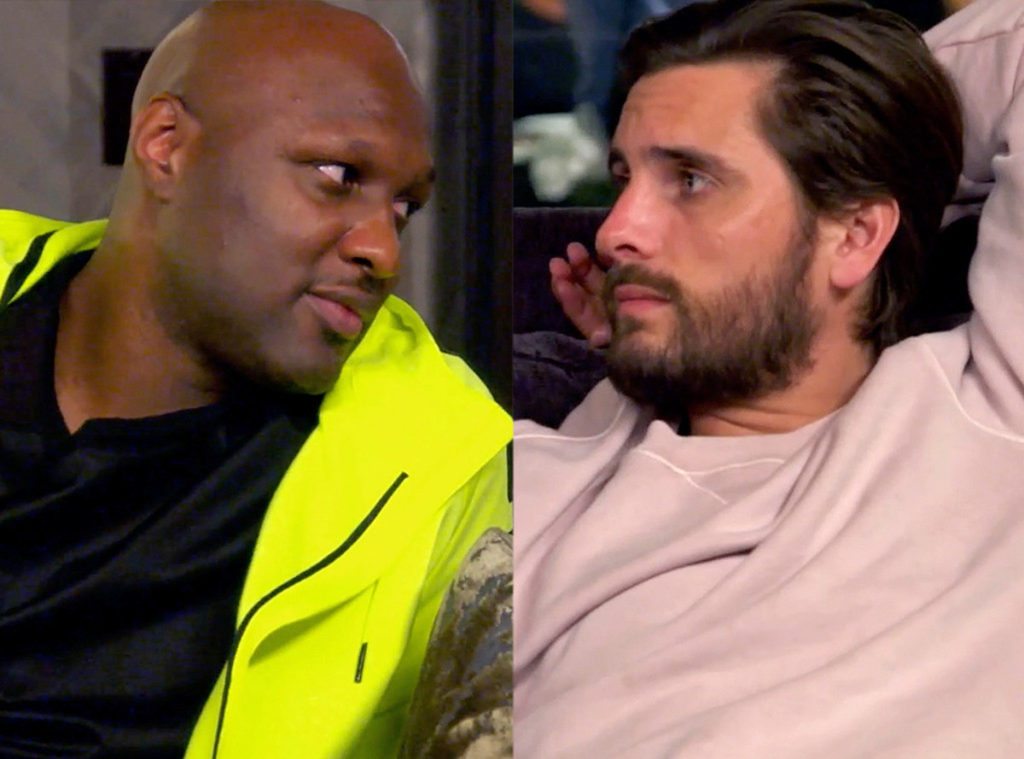It was one of the last places I ever thought I’d hear real talk about addiction, recovery, overdose and fear of relapse: Keeping Up with the Kardashians. While I admit to indulging in my fair share of reality television shows, the Kardashians aren’t ever at the top of my list to keep up with. However, I caught a glimpse of a preview of Sunday night’s episode: A very open and honest talk between Lamar Odom and Scott Disick. Odom, a former NBA star was hospitalized last October after overdosing on opiates and cocaine and lapsing into a four-day coma. His overdose was near-fatal. Disick’s own battles with addiction have played out on national television many times, including slamming a bottles of pills after a night of drinking. He has also spent time in treatment for substance use and addiction. In last night’s episode, Disick and Odom spoke candidly about their recovery journeys. Odom talks about feeling “scared half to death” when he woke up from his overdose coma, and how he felt trapped in his own body – unable to speak for days. “I couldn’t even say ‘excuse me’ or thank you.’” Disick opened up to Odom about how terrified he was seeing him in the hospital completely unable to function. When Odom tells Disick that he is taking things day by day, Disick responds, “Trust me, I get it. I’ve been there. You know I was in rehab for a while. I didn’t have contact with the world – it was a blessing.” The best piece of advice to come from the conversation? Disick tells Odom that he needs to steer clear of his old friends. “That’s the hardest part – just getting rid of all the bad people. You know what I mean?” [bottom-inline-cta]
“Getting Rid Of All The Bad People.”
We’ve often spoke about “detoxing your life” after rehab – getting rid of the things that are toxic to your recovery and could put you back into active addiction. One of the key components to detoxing your life is cutting out toxic relationship and the people that could drive you to drink or use drugs again. No matter your age, peer pressure is a powerful force – especially in addiction and recovery. The need to conform to the crowd has been proven by scientific research to be part of human nature. Having a strong support group is crucial to addiction recovery – but if any of those members of your support group don’t have your best intentions, it’s time to cut them out of your life. While it is one of the most difficult parts of early recovery, these are the reasons to end relationships:
- Old friends don’t have your best interest at heart. If your old friends are still using drugs or drinking alcoholically, their motivations revolve around the drink or the drugs. As you know, people in active addiction base their choices on their needs to drink or use drugs. What this means for you: Even if it seems like he or she is supporting you or cares about your recovery, in actuality, your well-being isn’t high on his or her list of priorities.
- Old friends will try to remind you of ‘happier times’. Remember when you were using how much of a mess your life was? Your old friends are still in that mess and don’t want to be there alone. Because misery loves company, they’ll tempt you with false memories of ‘happier times’ using and getting high. Your old friends just want to justify and validate their lifestyles – and their words aren’t true. Your life wasn’t great or happy when you were using: Don’t listen.
- Putting yourself in high-risk situations are not worth the risk. If you were deadly allergic to peanuts and you knew that a certain food your friends were eating may have peanuts in it, would you risk trying it? Even just a “taste test”? Probably not. The same goes for being around alcohol or drugs: You know that you have the disease of addiction and that even just one hit or sip could put you back onto a deadly spiral. Being around people who are using drugs or alcohol can put you on a fast track to relapse. Surrounding yourself with people who are actively using can quickly undo all of the hard work you put in during rehab and beyond.
- Support is crucial, but poor support is dangerous. Research has shown over and over again that developing a strong support group is one of the most crucial factors to a successful addiction recovery track. However, one of the leading factors for relapse is a poor support system. You need to surround yourself with people who truly care about you – not friends from your past who want you back in their circle of drugs and drinking.
So often it is said that addiction is a ‘selfish’ disease. Recovery, however, is when you really need to put yourself first. You’ve put in the weeks – perhaps even months – in a rehab program and are working hard to remain healthy, sober and balanced in your life. Put yourself first: Stick with your strong support group, develop new, healthy friendships and relationship and cut the old, negative people out of your life. In the long run, you won’t regret this decision.


